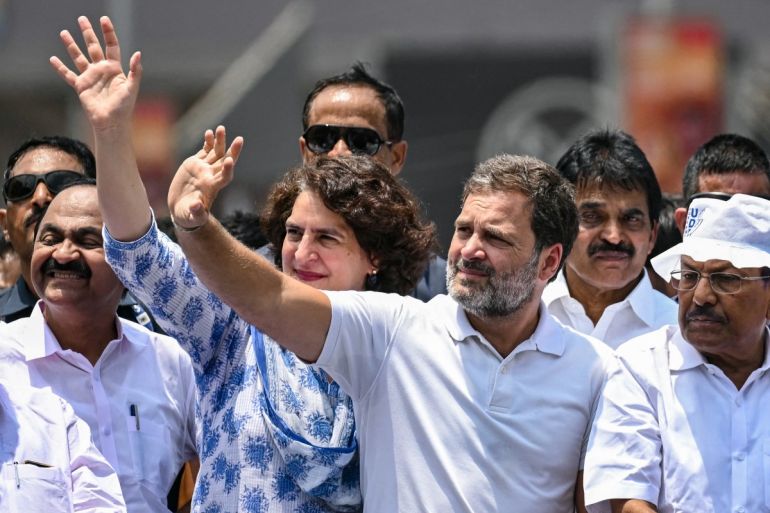Rahul Gandhi Files Nomination For India Election From Kerala Seat; Congress Party Accuses Government Of Account Freezing Before Election
Rahul Gandhi filed his nomination for the upcoming parliamentary elections in the country. Leading the opposition against Prime Minister Narendra Modi's government, Gandhi's decision to contest from Wayanad, Kerala, has sparked both enthusiasm and debate within the political sphere. Meanwhile, The Congress party has accused Prime Minister Narendra Modi's government of undermining democracy by freezing its bank accounts amid a tax dispute ahead of the upcoming general elections, a move that has significantly hampered the party's ability to conduct effective campaigning, according to Congress.

Rahul Gandhi, opposition coalition challenging Narendra Modi’s government, has officially submitted his nomination for the upcoming parliamentary elections in India and will be contesting from Wayanad, a constituency in the southern state of Kerala.
Ahead of his formal nomination, thousands of supporters gathered to rally behind Rahul Gandhi during a campaign procession. Despite facing significant challenges against Modi’s Bharatiya Janata Party (BJP), Gandhi still remains a central figure in the opposition’s efforts in this year’s polls.
Although Gandhi comes from a lineage of former prime ministers, his Congress party has faced decisive defeats in recent elections. Despite this, his decision to contest from Wayanad received enthusiastic support from the local populace, evident in the large crowd that cheered his arrival.

Addressing the gathered supporters, Gandhi, accompanied by his sister Priyanka and party cadres, expressed a familial connection rather than considering them merely as his electorate and conveyed his commitment to the constituency.
Following the rally, Gandhi formally filed his nomination for the Wayanad seat at the local election office. The constituency holds significance for him, as he was previously elected from there in 2019, despite facing disqualification temporarily due to a conviction in a criminal libel case filed by a BJP member.
While Gandhi’s decision to contest from Wayanad has garnered support locally, but it has also sparked tensions within the opposition alliance, particularly the Indian National Developmental Inclusive Alliance (INDIA), of which Congress is a part.
His main competitor, Annie Raja of the Communist Party of India, has criticized Gandhi’s choice, urging him to challenge an established BJP candidate in a different constituency.
Kerala’s Chief Minister Pinarayi Vijayan, a member of Raja’s party, has publicly questioned Gandhi’s decision, calling for national discourse on its appropriateness.
Gandhi’s loss in the 2019 general election in his former stronghold of Amethi, Uttar Pradesh, to BJP’s Smriti Irani has been attributed by him to the alleged misuse of state machinery by the ruling party.
The parliamentary elections, scheduled to commence on April 19, will witness nearly a billion Indian voters casting their ballots in a seven-phase process. The results of the elections will be announced on June 4.

Froze Our Assets
Meanwhile, the Congress party has levelled accusations against Prime Minister Narendra Modi’s administration, alleging an assault on democracy by freezing the party’s bank accounts amidst a tax dispute preceding the general elections.
Rahul Gandhi conveyed to journalists in New Delhi the debilitating impact the account freeze has had on the party’s ability to conduct effective campaigning.
Gandhi, 53, hailing from a family that wielded significant political influence in India post-independence, lamented the party’s erasure of its financial identity and consequent inability to support candidates or mount an effective electoral campaign.
A portion of the Congress party’s bank accounts was subjected to freezing in February due to an ongoing tax dispute dating back to 2018-19. Despite the party’s appeal, a tax tribunal recently dismissed it, allowing the recovery of 1.35 billion rupees ($16.32 million) in income tax from its accounts.
Ajay Maken, the Congress treasurer, asserted that tax authorities imposed a 2.1 billion rupee ($25 million) lien in mid-February, effectively sealing the party’s bank accounts, and subsequently confiscated 1.1 billion rupees ($14 million).
The party contends that the tax department’s actions are politically motivated and aimed at impeding its ability to challenge Modi’s Bharatiya Janata Party (BJP).
Rahul Gandhi accused the Prime Minister and Home Minister of orchestrating a “criminal action” against the Congress party, dismissing claims of democracy in India.
Meanwhile, Sonia Gandhi, his mother and former Congress chief, in a rare public appearance, characterised the tax penalty as part of systemic efforts to undermine the party.
In response, the BJP refuted the allegations, attributing the partial freezing of Congress’s bank accounts to its failure to file income tax returns for cash donations received in 2017-18, consequently losing the tax exemption available to political parties.
Meanwhile, the financial disparity between BJP and Congress has widened significantly, particularly after the introduction of electoral bonds in 2017, with the BJP receiving substantially larger donations.
As India’s voting process, spanning seven phases from April 19 to June 1, approaches, the lack of funds has left Congress feeling disadvantaged, according to its president, Mallikarjun Kharge, who bemoaned the absence of a level playing field.






